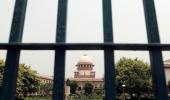The time for NJAC was ripe in 2014-15 when it was first mooted and put to vote. It is certainly ripe today, says former Union law minister Ashwani Kumar. The processes of public opinion are moving robustly in favour of an alternate mechanism for the appointment of judges, he says.

Former Union law minister Ashwani Kumar on Sunday said the time is ripe for replacing the present collegium system of judicial appointments and "processes of public opinion are moving robustly" in favour of an alternative mechanism for judges' appointments.
He also called upon the Supreme Court to put in place a robust in-house mechanism to address the issues ailing the judiciary including charges directed at judges.
In an exclusive interview with PTI, the former Union minister of law and justice spoke at length on several contentious issues, like mechanisms for the judiciary to address ailments within, judicial appointments and National Judicial Appointments Commission, and laws passed by Parliament being increasingly challenged in courts.
"The time for NJAC was ripe in 2014-15 when it was first mooted and put to vote. It is certainly ripe today. And now, I am convinced that the processes of public opinion are moving robustly in favour of an alternate mechanism for the appointment of judges. It could be on the lines of the proposed NJAC, it could be something better," Kumar told PTI.
The former Congress leader said the government is fully within its rights to bring a revised constitutional amendment for the appointment of judges that will satisfy judicial scrutiny.
It was during Kumar's tenure as law minister that the NJAC bill was drafted under the United Progressive Alliance rule, but it was later passed in an amended form after the National Democratic Alliance assumed power only to be quashed by the Supreme Court in October 2015.
On why he believed that it was time for NJAC to be brought in, Kumar said he had a serious issue with the validity of the judgement whereby the NJAC was struck down as unconstitutional, even though it had the "supreme will and majority of the Parliament".
He said the principal reason for the court to strike down the NJAC system was that the government representatives and eminent persons to be appointed by the government on the NJAC could compromise the independence of the Judiciary.
"In my considerate view as a lawyer, and this is the view that the minority judgement of Justice J Chelameswar takes in that case, there is no equivalence between the independence of the judiciary and the manner and mode of appointment of judges to extend the doctrine of the independence of the judiciary to the mode and manner of appointment of judges is a flawed extension of the doctrine," he said.
"Where can we derive the presumption that the government will always recommend judges that are first class and where is the presumption that the judges will always select the best judges," Kumar said, adding that appointments made by the government have been one of the best in the past.
"It is a flawed extension of the doctrine of judicial independence to suggest that in case the committee for appointment of judges has a government nominee or an executive representative on it, the independence of the jurisdiction would be impacted," he added.
Quoting a famous American judge, he said, "For how long will the people have faith in the judges who have lost faith in the people and their representatives".
He, however, feared, "If you start drawing a wedge between the judiciary and the executive in the matter of high judicial appointments, a day is not far off when there will be an institutional conflict and that will be absolutely fatal for the governance of constitutional democracy."
On contentious laws passed by Parliament, including the Waqf Amendment Act, being increasingly challenged in courts, Kumar said this is one of the principle issues that the nation and its political and judicial processes have to address in the very near future, while noting that almost every major question of political significance and with political ramifications is somehow shunted off to the Supreme Court.
"It may suit the political executive of the time to have difficult questions being settled by the Supreme Court or it may even suit the opposition to challenge every measure of the government in the Supreme Court, but it is unfair to the judiciary as an institution."
The judiciary itself has repeatedly said that it is not part of the judicial function to enter into the political thicket, he noted, adding that questions that are essentially political are to be ultimately decided in the people's court.
Therefore, when the judiciary is called upon to sit in judgement over issues of great political moment, questions are being raised about whether the judiciary is unduly enlarging its remit, he observed.
"The power of judicial review which was vested by the Constitution in the judiciary was essentially meant to protect the citizens in the defence of their fundamental rights.
"It was not intended to be an instrument for the judiciary to nullify the will of the people," he said, noting that the Ninety-Ninth Constitution amendment that brought in the NJAC, when it was struck down, had the support of the overwhelming "supermajority" in Parliament.
"At some point in time can you take away the majoritarian will of the people from the constitutional democratic processes? You cannot. At the same time, you have to temper the exercise of the sovereign will by principles of accountability enshrined in the Constitution.
"But the Supreme Court cannot use that role to progressively keep enlarging its own remit at the cost of Parliament's remit. So these questions are very pertinent questions and they have to be addressed.
"And you would have seen that voices are being raised inside Parliament that this can't go on," the former Law minister stressed.
Kumar termed as "unfortunate" the incident of recovery of cash from the residence of a high court judge in Delhi and said the Supreme Court must make its in-house processes more just and balanced so as to protect judges from frivolous charges and provide an effective redressal mechanism.
At the same time, he said, "I do not think it is fair to say that the incident is being used by the government to grab the power of judicial appointments."
He said the incident has ignited a debate about the process of judicial appointments.
"I believe that the striking down of the NJAC by the Supreme Court as unconstitutional is itself a questionable exercise of the judicial review power considering that the constitution amendment motion was passed by Parliament with a more than two thirds majority of members present and voting, reflecting the sovereign will," he said.
Kumar said the cash recovery case has cast a shadow on the institutional integrity of the judiciary and even in the initial stages of inquiry, the judge stands "pilloried and condemned".
"It is absolutely true that the unfortunate incident has cast a long shadow on the institutional integrity of the judiciary, but it has also given rise to many fundamental principles of constitutional jurisprudence," he noted.
He said in this particular case, even when the initial steps in the inquiry process are underway the judge stands pilloried and condemned, both in the media and by virtue of punitive transfer to Allahabad and withdrawal of work from him.
"I think a time has also come for the Supreme Court to review the in-house procedure to make it more just, to make it more balanced, and to be able to subserve its purpose, which was to protect judges from frivolous allegations and at the same time to provide an effective redressal mechanism to address the ailing issues of the judiciary," he observed.










